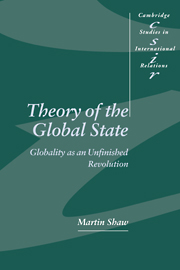Book contents
- Frontmatter
- Contents
- Preface
- 1 Introduction: globality in historical perspective
- Part I Critique
- 2 Critique of national and international relations
- 3 Intimations of globality: Hamlet without the Prince
- Part II History and agency
- Part III State
- Part IV Conclusion
- References
- Index
- CAMBRIDGE STUDIES IN INTERNATIONAL RELATIONS
3 - Intimations of globality: Hamlet without the Prince
Published online by Cambridge University Press: 07 October 2009
- Frontmatter
- Contents
- Preface
- 1 Introduction: globality in historical perspective
- Part I Critique
- 2 Critique of national and international relations
- 3 Intimations of globality: Hamlet without the Prince
- Part II History and agency
- Part III State
- Part IV Conclusion
- References
- Index
- CAMBRIDGE STUDIES IN INTERNATIONAL RELATIONS
Summary
The social sciences have long contained, in a double sense, the challenge of the global. The modern tradition of social theory and analysis has encapsulated the essentially political tension at the heart of globalization. On the one hand, the master ideas of social thought, developed from the late eighteenth to the early twentieth century, centred on concepts of universal, implicitly global significance – civil society, capitalism, industrialism, modernity. On the other hand, the twentieth-century institutionalization of the social sciences in academic disciplines, research and teaching practice have largely nationalized and internationalized these concepts. Theory and analysis have come to refer, implicitly if not always explicitly, to the national and international frameworks of state and society that dominated social relations in the mid-twentieth century heyday of the nation-state.
The new transparency of global relations has therefore brought with it a conceptual crisis in the social sciences. Since the very meanings of core concepts change in a period of transition, we need to redefine them for a global age. Globality challenges the disciplines to move beyond the ways of thinking which have predominated in their historic development. We need, too, to reimagine the interrelations between the different social science disciplines.
In this chapter, I examine, first, how the social sciences have been contained by pre-global thought, and second, the forms that the amplification of the global has taken.
- Type
- Chapter
- Information
- Theory of the Global StateGlobality as an Unfinished Revolution, pp. 67 - 98Publisher: Cambridge University PressPrint publication year: 2000



